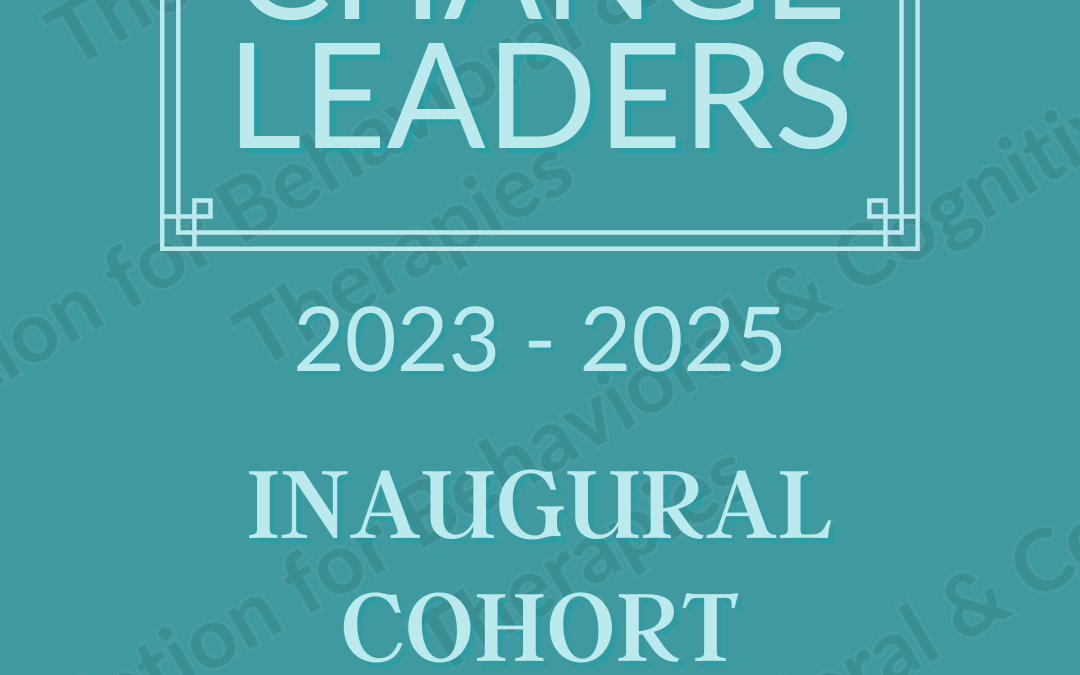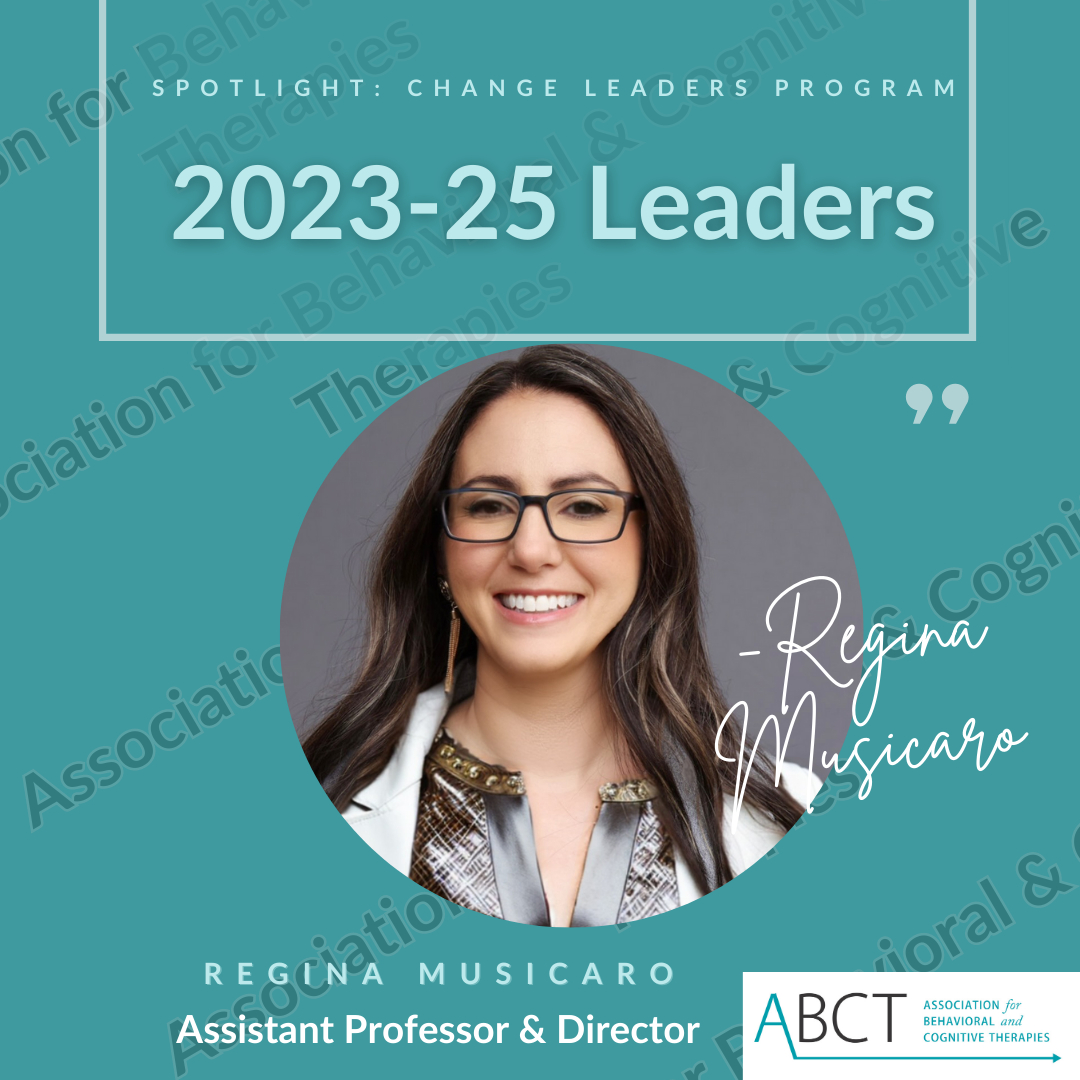Find a CBT Therapist
Search through our directory of local clinicians.
Our Inaugural ABCT CHANGE Leaders – Challenging How ABCT Now Governs & Evolves
ABCT is excited to introduce our first inaugural cohort for our CHANGE Leaders Program- Challenging How ABCT Now Governs & Evolves.
Our cohort brings an invaluable breadth of knowledge across programs, schools, and professions. Joining us are Postdocs, Researchers, Clinical Psychologists, Lecturers, and Ph.D. Candidates.
Our cohort members serve a two-year apointment, with our inagural cohort serving from 2023 to 2025. Our CHANGE Leaders will engage with the activities of ABCT, including our Board and other leadership organizations. Through transparency, we hope that leaders across our organization will work collaboratively on identified areas of change.
Derrecka Boykin
Derrecka Boykin, Ph.D., is a clinical psychologist and health services researcher at the Center for Innovations in Quality, Effectiveness and Safety at the Michael E. DeBakey VA Medical Center in Houston, Texas.
She is also an assistant professor at Baylor College of Medicine. Her research and clinical interests focus on improving patient experiences and mental health delivery by engaging and building partnerships with patients, their families, and health care systems.
Jasmin Brooks Stephens
Jasmin Brooks Stephens is a Clinical Psychology PhD Candidate at the University of Houston, and an incoming Clinical Psychology Intern at Massachusetts General Hospital.
She utilizes a mixed-method approach to examine how culturally relevant risk and protective factors influence suicide and mental health outcomes for Black youth and emerging adults.
Through her research, she aims to contribute to the creation of interventions, programming, and policies that focus on reducing racism-related stress, suicide, and mental health disparities within Black populations.
Celenia DeLapp
Her research and clinical interests center on the experiences and strengths of Latine immigrants, as well as other BIPOC youth and families. She specializes in disseminating culturally responsive care frameworks, which includes a training curriculum she created and implements as a consultant for psychology group practices.
Dr. DeLapp completed her pre-doctoral internship at Montefiore Medical in the Child and Adolescent Specialization Track in June 2023, and will continue providing services in Bronx, NY as a post-doctoral fellow in Montefiore’s Adolescent DBT, Eating Disorders, and Anxiety and Mood programs for the 2023-2024 academic year.
Alexandria Miller
Alexandria Miller (she/her) is a recent graduate of Suffolk University’s Clinical Psychology doctoral program and will become a post-doctoral fellow in the Women’s Health Sciences Division of the National Center of PTSD in VA Boston.
She is interested in adapting evidence-based treatments for PTSD and anxiety disorders for BIPOC individuals. She currently serves as a co-chair of the Oppression & Resilience: Minoritized Mental Health SIG at ABCT.
She’s excited to be involved in the CHANGE leaders program and learn more about governance in an international organization, with a focus on the ways in which systemic organizational change can shift the field of psychology to prioritize anti-oppressive, equitable, and kind practice.”
Hannah Morton
Her research examines differences in neurocognitive development and environmental stressors that impact social expectations and outcomes for autistic and ADHD youth.
She has a particular interest in diagnostic validity and measurement precision in relationship to the experiences of autistic youth and young adults.
She is Co-Chair elect of the ABCT Autism Spectrum and Developmental Disabilities (ASDD) SIG and on the leadership team for the INSAR Autism PROMnet SIG.
Regina Musicaro
Dr. Regina Musicaro is an assistant professor at the Psychiatric Research Institute of Montefiore Einstein in the Bronx, NY. She is a licensed clinical psychologist in New York and Connecticut.
She researches therapeutic, systemic, and political solutions to healing from mental illness and the effects of adversity.
She is also the director of Trauma, Healing and Resilience in Vulnerable environments. T.H.R.I.V.E. is a transdiagnostic specialty program at Montefiore Medical Center in the Bronx, New York, that offers principle-driven, flexibly-delivered, evidence-based psychotherapy for patients ages 18-64 seeking treatment for trauma-related distress, inclusive of PTSD, Complex PTSD, racism-related stress and trauma, and trauma related to marginalization based on gender expression.
Giovanni "Gio" Ramos
Broadly, his research program focuses on addressing mental health inequities affecting racially and ethnically minoritized populations through improving the cultural and contextual fit of mental health services, as well as making evidence-based treatments more widely available through digital approaches.
Additionally, he has a deep commitment to advancing diversity, equity, and inclusion in higher education, clinical training, and professional organizations.
Ilana Seager van Dyk
She completed her Ph.D. at the Ohio State University, her internship at UCLA Semel Institute, and her postdoctoral fellowship at the Yale LGBTQ Mental Health Initiative.
Timothy Stahl
Dr. Timothy Stahl is a clinical psychologist at the Institute for Advanced Medicine at Mount Sinai Hospital in New York.
His clinical work focuses on providing flexible, evidence-based interventions to a wide range of individuals across cultures, race, genders, and sexual orientations, in both English and Spanish.
His background is in anxiety, depression, and trauma-related disorders. He also provides supervision, consultation, and teaches on providing LGBTQ+ affirmative care within healthcare settings.
Elliot Weinstein
Elliott is a 5th year doctoral student in clinical-health psychology at the University of Miami, working alongside Dr. Steven Safren and Dr. Audrey Harkness.
His research program and clinical interests focus on health equity as it relates to HIV, as well as sexual health outcomes among older adults, sexual and gender minorities, and other marginalized groups.
He is thrilled to be a member of the inaugural cohort of ABCT Change Leaders to advance issues related to diversity, equity, inclusion, and social justice within ABCT and the larger clinical psychological science community.











